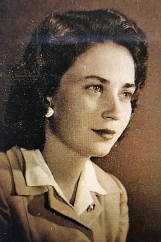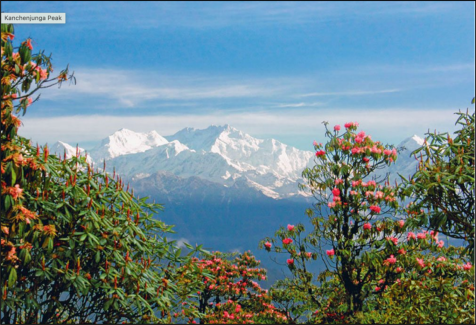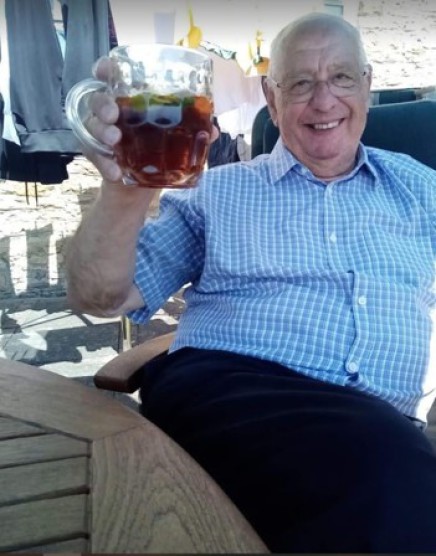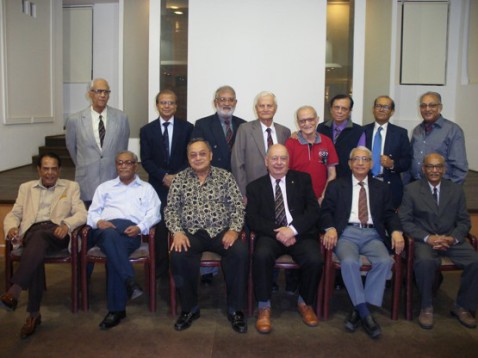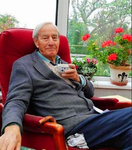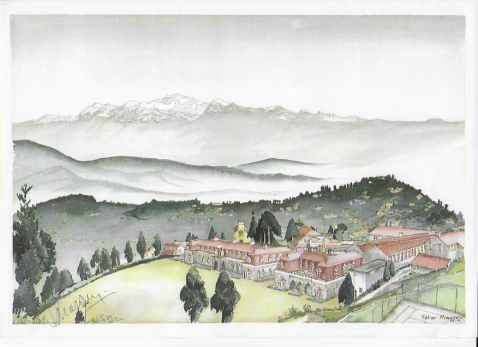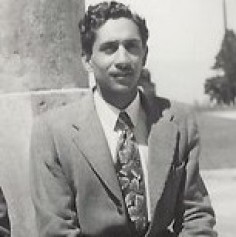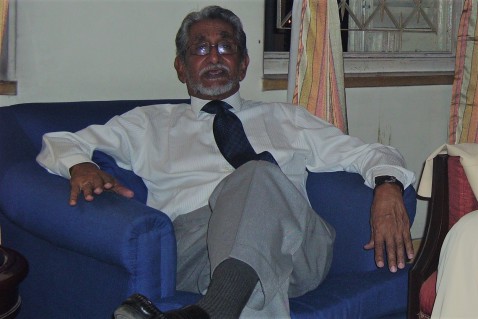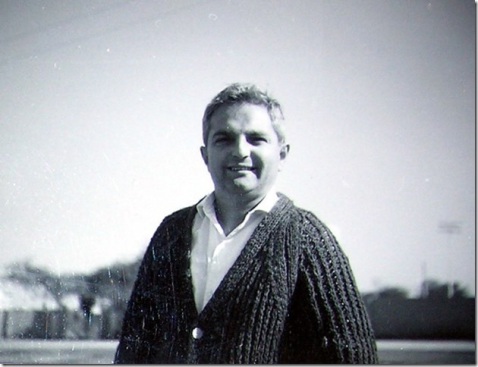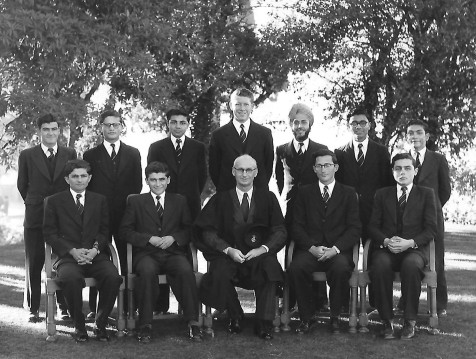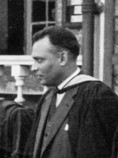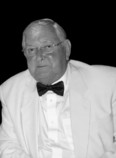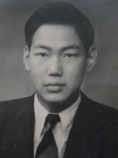In memoriam
From Arshak, Jenny, and Margaret Sarkissian:
Dear friends and family,
We promised that we would hold a celebration of mum's life in Penn, where she and dad lived happily for 47 years, so that many of their friends and family members who were unable to attend the funeral in January will be able to gather and share memories.
I have attached an invitation to this email.
In case you have difficulty opening the attachment, here are the relevant details:
When: Saturday, June 1, 2024, at 2:30 PM
Where: Holy Trinity Church, Church Road, Penn, High Wycombe, Bucks. HP10 8NU
There will be a reception afterwards at the Church Hall (opposite the church)
We would be grateful if you could RSVP by April 14, if you plan to join us (for catering purposes).
We will be assembling a small collection of memories, reminiscences, and photographs. If you would like to submit something - whether or not you are able to attend - please send it directly to me or, if you prefer, upload it to the Much Loved tribute site: https://edwinasarkissian.muchloved.com
Edwina Roselyn Sarkissian (1938-2023)
Edwina Roselyn Sarkissian was born in Madras, India, in August 1938. Due to World War II, she was sent to Baldwins Girls School in Bangalore with her older sister, Pam. At boarding school, she excelled in netball and swimming, became School Captain in 1954, and created lifelong friendships that spread across the globe. These relationships have endured for more than seven decades, cemented by regular Old Girls’ Reunions, many of which she organized, including the school’s 100th anniversary in 2003.
After qualifying as a teacher in 1958, Edwina took her first post at the junior school of the prestigious St. Paul’s School in Darjeeling, where she met her
future husband, Arshak Sarkissian. They married in England in August 1961 and had two daughters, Margaret and Jenny. The family moved from Slough to Tylers Green in Buckinghamshire, in 1974, where
they lived happily for 47 years. Edwina continued working as an infant schoolteacher until she retired in 1991. After retirement, Edwina devoted herself to her gardening and became quite an expert in
this new venture, winning the local Best Kept Garden competition two years in a row. She and Arshak also travelled extensively to Australia, New Zealand, Japan, Thailand, Sri Lanka, India,
Switzerland, Germany, France, Russia, USA, and Canada. In 2021 they moved to Lichfield, Staffordshire, to be closer to Jenny and her family.
Edwina was a devoted sister, wife, mother, and grandmother. She is survived by her beloved husband of 62 years, Arshak; her siblings, Fred and Barry; children Margaret and Jenny, their respective
husbands, Jerry and Alan; and her only and much-loved grandson, Raffi.
A legend of the OPA passes away. Surajit Kar (OP 1985) writes a fitting tribute to Ken Pearce.
Ken Pearce – Requiem for an Inimitable Paulite
Ken Pearce loved rhododendrons. He loved St. Paul’s. He loved Kanchenjunga. Ken Pearce loved the bursts of red rhododendron blossoms around the Chapel slopes as they bloomed beneath the magnificence of snow-capped Kanchenjunga.
Ken bled St. Paul’s. Anyone who knew Ken, or even met him briefly, felt his
inimitable school spirit. Having spent 10 years at St. Paul’s in the 1940s and
1950s, he epitomized what it means to be a Paulite, the education we received, the values we learned, and the ethos that was inculcated into our bones. He set the aspirational example of St. Paul’s ethos that Paulites around the world can only hope to emulate.
Ken gave back in countless ways to the school that shaped him. Over countless trips to St. Paul’s, he stayed abreast of the evolving situation in Darjeeling, met with many a Rector, headmaster, and schoolteacher, and inspired many generations of Paulites in school. On each visit, with heartfelt concern for the school, he identified specific needs of the school to make the lives of Paulites better, then rallied Old Paulites around the world to common cause. Ken gave back to St. Paul’s, perhaps more than any single Old Paulite in a century. Ken created Old Paulite communities wherever he went: finding the common thread among Old Paulites regardless of generation or geography. He Chaired the Old Paulite Association (Europe) for many years and built an Old Paulite fraternity in London, England, and across Europe. If there was a gathering of Old Paulites anywhere in the world, odds are Ken was there. In North America, Ken was a regular feature at OPANA events, and was the glue that enabled OPA(E) and OPANA to partner on many a charitable mission for St. Paul’s.
I had the honor and privilege of working with Ken over the last 5 years on Vision- 2023, a global effort to revitalize the school in advance of its 200th-year anniversary. We travelled together across many Old Paulite communities, San Francisco, Toronto, London, Delhi, Mumbai, Kolkata, Darjeeling, Guwahati, and Bangkok. He was instrumental in building a bridge between the Old Paulite community, several Bishops of Calcutta (who by title, represent the Chairman of the St. Paul’s Board) and the school administration. At each event, in every encounter, Ken inspired, he led, he did, all in an effort to improve the school. His contribution to St. Paul’s is immeasurable.
One discussion is etched in my mind. Ken and I were working together on a
communication to Old Paulites worldwide. I drafted the message and ended with the obligatory school motto:
“Moniti Meliora Sequamor
Having been advised, follow better things.”
Ken called immediately with these words:
“Surajit, thank you work working on the communication piece. But the translation is wrong. The Latin phrase means “Having been advised, follow higher things”. Not better things. Oh, and by the way, you spelt Sequamur wrong. It has two “U”s, not one”.
Shame on me! Thank you, Ken! For schooling me decades after school!
To refer to Ken Pearce as an “Old Paulite” has always been a misnomer. He was always young at heart, well into his 80s. All who knew him, appreciated his dry humor, how he was always ready for a drink, beer or Scotch, a laugh, a memorable story about shared days at St. Paul’s.
I call on all Paulites, old or young, to raise a toast for Ken. When you are together with another Paulite, raise a glass for Ken. And thank him for his immeasurable contribution to our school.
On the 4th of December 2020, Ken Pearce passed peacefully to the great
beyond. At that moment, on the Chapel slopes of St. Paul’s, beneath the
magnificence of snow-capped Kanchenjunga, a rhododendron bloomed.
Surajit Kar
Moniti Meliora Sequamur (with two “U”s)
Having been advised, follow higher things (not better things)
We heard a few months ago from Chris Tobin that Don Tanner, a distinguished Old Paulite and excellent cricketer, had passed away in Australia. Don was known to a number of our members and Ken Pearce remembers that "He truly was a genuinely great bloke, a true Old Paulite, a good sportsman even into his later years, and a perfect gentleman."
DONALD J. TANNER
CRICKET C.V.
Born 21st September 1930 in Kerman, Persia
1939 - 1945 Learned cricket at St. Paul's School, Darjeeling, India.
At age 14, represented the School 2nd XI.
1946 - 1949 Played cricket at Cranleigh School, Surrey, England.
Coached by C. W. L. (Charlie) Parker, England & Gloucestershire
left arm spin bowler.
Represented the School 1st XI 1948 & 1949.
1949 - 1951 Played cricket for the British Army Intelligence Corps in London, U.K.
1952 - 1955 Played cricket for the Madras Cricket Club 1st XI.
Contemporary with Indian Test Cricketers, C.D. Gopinath (subsequently Chairman of Indian Selectors), N. Kannayiram,
and several Madras State players.
1956 - 1959 Played cricket for Lima Cricket Club, Lima, Peru.
Represented Peru in "Test Match" vs. Chile 1958 -
- "Man of the Match" (78* 1st Innings batting and
7/15 2nd Innings bowling).
1960 - 1998 Played cricket in Vancouver, Canada for:
1960 - 1967 Vancouver Cricket Club
1967 - 1970 Pitt Meadows Cricket Club
1971 - 1975 Vancouver Cricket Club; President 1971 - 1975.
1976 - 1988 Vancouver Juniors Cricket Club
1989 - 1995 Vancouver Cricket Club; President 1989 - 1995.
1996 - 1999 Vancouver Cricket Club & West Vancouver Cricket
Club (amalgamated)
1996 - 1967 Captain - Vancouver Cricket Club
1967 - 1970 Captain - Pitt Meadows Cricket Club (League
Champions 1969 & 1970)
1968 - 1970 Captained the Province of British Columbia
- 1969 - Inter-Provincial Championship;
- 1969 - MCC (also other international visiting teams).
1970 Toured England with British Columbia Team.
1972 Toured England with British Columbia Team.
1976 - 1988 Captain & Playing Coach - Vancouver Juniors Cricket Club. Responsible for coaching and development of junior cricketers (up to age 18) in the Province of British Columbia.
1988 Elected a Life Member of West Vancouver/Vancouver Cricket Club.
1980's & 1990’s - Played for British Columbia Cricket Club on several international tours, including Golden Oldies Cricket Festivals: Vancouver 1990, Christchurch 1992, Birmingham 1994, Sydney 1996, Cape Town 1998, Sunshine Coast 2004, Colombo 2006.
2004 - 2013 Played cricket for the South Australian Over 60's Cricket
Association (now Seniors Cricket South Australia).
2014 - Retired from cricket.
-
South Australian Seniors Cricket Zonal Championship Trophy named the Don Tanner Shield.
A tribute from the OPA Kolkata
David Gibbs (1926-2020). Rector 1964-72.
David Gibbs
was born in England in 1926. He was educated at Gayhurst (Preparatory) School
which his father ran from 1927 for 42 years. The school is in Gerrard's Cross in Buckinghamshire and continues to flourish to this day. From there David went to Rugby School and then got an
Exhibition (scholarship) to Clare College, Cambridge, to study Engineering. At Cambridge he played rugger, as hooker, for Cambridge University as well as for Clare College and the Harlequins Rugby
Football Club.
After Cambridge David then did his National Service and was posted with the Royal Engineers to Tripoli in Libya. It was here that he met his wife-to-be, Sally (Dobbs), who was out there staying with
the Chief Administrator of Tripolitania. They married in Ireland in 1952.
On his return from Tripoli and National Service he joined an engineering firm in London – Binnie, Deacon and Gourley – but soon after, his father C.C.S Gibbs asked him to help him at Gayhurst School.
He dutifully left his engineering career to do so and later moved on to Repton School in Derbyshire to teach Maths and Physics.
In 1964 David applied for Headships, sponsored by the British Council. These were overseas jobs in Peru, Laos, Fiji, Burma and India. Initially he was selected for the Burmese job in the Shan States,
a two-day overland journey from Rangoon, but this did not materialise owing to civil war. He was then offered the post of Rector of St. Paul's School in Darjeeling, India. David and Sally, along with
their three children – Lucinda(6), William(4) and Alexander(2) – set sail from Tilbury Docks in London on the P & O liner Orsova to Bombay – a three week journey through the Bay of Biscay into
the Mediterranean and on through the Suez Canal – the start of a true adventure. They arrived at St. Paul's in May 1964, having stopped in Bombay (staying with the Bishop) and Calcutta (at the Great
Eastern Hotel).
The next nine years were for David and the family
a very memorable and life-changing experience. In place of the rather old-fashioned cadet force David introduced the "Pioneers" which involved camping and bivouacking, metalwork, rock-climbing,
trekking (learning to use compasses etc.) and other outdoor activities such as building fences.
Some boys even remember being encouraged to help with white-washing certain areas of the school or building beds in the carpentry room, for David was very hands-on with the maintenance of the
buildings and went around regularly with the Estate Manager inspecting the school and grounds. He introduced boxing in 1968 and shooting (with .22 rifles) on the range above the school field.
Trekking in the Himalayan foothills was encouraged, particularly for those unable to return home to their families in the holidays, and many Old Paulites remember these exciting times. During his
time drama and music flourished, including folk-dance items and Gilbert and Sullivan operettas such as Trial by Jury (staff) and
Ruddigore by the school. David was instrumental in John Billington (then on the staff) moving to Repton in 1965, and in inviting
various family and friends from England to teach or work at St.Paul's. These included Roy and Shirley French (and their two boys), Patricia Blackley, Lucinda Turner (and her son Jolyon) and David's
mother who spent three months in Darjeeling. During his tenure at St. Paul's David was supported by a wonderful staff, including N.K.S.Rao as Senior Master and Chris MacDonald as Head of the Junior
School.
A note from an Old Paulite concerning "baths" serves to highlight the changes:
"The biggest change when Mr. Gibbs arrived related to the availability of hot water for baths. Before that we had tub baths scheduled for twice a
week, one at 5 a.m. and the other in the afternoon. In the early session the water was too hot to use directly in the tub, but when you added cold water it invariably became too cold! So virtually no
boy actually had a bath in the morning session – we just stirred the water around and went back to bed. When Mr. Gibbs arrived the first thing he did was to install wood-fired water-boilers for the
dormitories. Each afternoon we could have showers with comfortably hot water! It was an absolute delight after sports, and this also eliminated the 5 a.m. sessions. We were all overjoyed – and stayed
much cleaner to boot!"
One of the many highlights for David and Sally in Darjeeling was going to the Coronation of the 12th Chogyal of Sikkim, Palden Thondup Namgyal, in 1965. Returning from the celebrations their driver
managed to go over the edge of the road – but fortunately it was a mere 30-foot drop instead of the usual 100 feet so they survived to tell the tale.
There were challenges too, such as the strike among the domestic staff. Some of the senior boys and David broke through the line to the Dining Room and David got hit on the head with an umbrella by
the head Mali. All was forgiven in the end. Other not-to-be-forgotten episodes were concerns over the Chinese threats around the Nathu-la (pass) in 1965, and the war in East Pakistan in 1971 that
resulted in the creation of Bangladesh when St. Paul's and other schools in Darjeeling sent senior boys down to the border to help in the refugee camps at Islampore.
The British Council withdrew their sponsorship in 1972 and David had to make the decision whether he wished to remain in India under the Indian education system or to return to the UK to continue
teaching there. He had six months to make the decision.
With heavy heart and considering many factors he decided to return to England. Distance prevented him getting interviews for Headships but he accepted a job at his old school (Rugby) to teach Maths
and Physics. It was a huge change form the hills of Darjeeling to the red brick of midlands England, and a great challenge for all the family.
In 1973 David was awarded an OBE (Order of the
British Empire) for his services to education in India.
In 1974 David was interviewed for, and got, the job as Warden (Headmaster) of St. Columba's College in Dublin, Ireland. He remained there until 1988 when his health dictated he retire. He and Sally
moved to Bellmount, near Cullahill, in the countryside of Laois, which remains their home. His retirement years saw his engineering and DIY skills come to the fore as he worked on restoring the
period house they had bought. He also spent time farming in a small way on their 25 acres of land – keeping cattle, growing hay or making silage, and growing vegetables and keeping bees. He also
continued with his playing of the French horn with the Dublin Orchestral Players. His concern for animal welfare led him to work with the Irish Society for the Prevention of Cruelty to Animals, both
in Dublin and locally in Laois. Latterly, when managing the land became too much for him to do on his own, he let the land to a local farmer who continues to graze his cattle on it.
Till his last days, David continued to talk about the wonderful times spent in India, the friends made there, and about his old boys, many of whom continued to keep in touch in one way or another.
Whenever he had the opportunity he visited London and India where he met the Old Paulites who thronged to be with their beloved Rector.
David Gibbs breathed his last at a hospital in Dublin on 21st June 2020. As per his wishes, he will be cremated in Dublin on Wednesday 24th June 2020.
His passing away is a great loss to all his boys, particularly those who were in school during the Gibbs years. We have lost a great man, a devoted teacher who strengthened the school, implemented
robust outdoor activities, led by example, and above all inculcated a sense of self-dependence in all of us.
Farewell, Sir.
Syed Haider writes on behalf of the OPANA
Dear Cindy,
On behalf of myself and the OPA-North America community, I extend to you, Mrs. Gibbs and to the Gibbs family our deepest condolences. We are truly sorry for your loss and we collectively grieve for the passing of an absolute stalwart in the eyes of so many Paulites.
Dedicating one’s life to being an educator is a noble calling. The reward is the enrichment of young minds, and their eternal gratitude. The outpouring of love and affection from so many Old Paulites, whose lives Rector Gibbs touched in a positive way is a testament to his life’s work. I consider it my misfortune that I missed his tenure as your family had departed for England a couple of years before I joined St. Paul’s. Rector Gibbs’ praises were sung even during my years at SPS and continued long after I graduated.
As a proud graduate of St. Paul’s I’m a beneficiary of the heritage that your father helped establish at St. Paul’s. I thank him and your family for the dedication and sacrifices made towards our alma mater, its staff and its boys. Rector Gibbs’ legacy will always be remembered, just as our thoughts and prayers will be with you and your family.
With love and respects,
Syed Haider
President, OPA-North America
David Medland recalled to Cindy Gibbs
My last year at SPS was in 1964 when Pa Goddard handed over to David mid-year and in the short space of my remaining time at the school, got to know David quite well, especially on the music front. David was a keen French horn player and he introduced me to Mozart's horn concertos, especially K447, which is now one of my favourite Mozart's compositions. Both David and Sally wrote very affectionately in my school autograph book when I left. Indeed, I recently recalled to Cindy......
Your Mum and Dad's trekking jaunts reminds me of the time in December 1964 when the 6th and Upper 6th form remained in school (after all the other boys had left) to do our SC and HSC exams. Larp Chia (the school captain at the time) and I had a free afternoon and your Mum and Dad took us in the school Jeep on a jaunt to scout out some rock climbing places. It was an overnight trip where we spent the night at a bungalow on a tea garden (can't remember where!) .
Both Larp and I spent the night in the bungalow, but your Mum and Dad insisted that they were going to spend the night in a tent outside the bungalow because they wanted to try out the tent they had recently obtained! I remember it amused us at the time because the sleeping arrangements should have been the other way round (ie the Rector and his wife in the bungalow with us two slumming it in the tent!!) Anyway, we had a great time.
2019
Peter Massey remembered (Joe Hammond writes)
Peter Eric Massey died on the 23rd November 2019. Peter was at St Paul’s from 1957 to 1959. His mother Caroline Massey was a teacher in the Junior School and Peter’s sister Louise attended Kindergarten for a year (with Betty Elloy), then went first to Dowhill, Kurseong and later to Loreto Convent.
Peter was married to Christine and lived in Mereworth, Kent. Contemporary Joe Hammond knew Peter as a self-driven Paulite, a hugely talented musician and artist, who tested boundaries to the limit. At an OPAE Reunion we auctioned prints of a drawing he did of St Paul’s in 1976 (attached).
Louise (now Lee) lives in Romsey. She and husband Richard are regular attendees at our OPAE Reunions.
Peter’s funeral will be at 12.15, Tunbridge Wells Crematorium on 12 December 2019.
Zarir Cama remembers :
Peter - much senior but a strong boxer - and of course their Mother Mrs Massey who was my dormitory matron in Junior School. I bought one of his paintings and it hangs in my brother's home in Bangalore where I was recently and admired it.
Betty Elloy remembered (Gerry Elloy writes)
2018
Bernie Brooks (Ken Pearce writes)
Bernard T Brooks 1929 – 2018
Bernie Brooks, teacher and friend of many Old Paulites, and indeed of so very many of his students of Dr Graham’s Homes in Kalimpong, died on New Year’s Eve a few days ago, just 10 days after his 89th Birthday.
A service of thanksgiving for his life was held in St Paul’s Cathedral Kolkata on the 3rd January attended by former students and friends. Tributes received from all over the world were read by daughter Pauline and son Brinsley. Daughter-in-law Anita and grand daughter Jaipreet read from the Bible. The Graham’s Choir sang psalm 23 and the moving service ended with the hymn, “Abide with Me.” Old Paulites Arun De and Tutu Bose, a very close friend with whom he had kept in very close contact over the years, were present among a large congregation of Grahamite friends and admirers.
Bernard Brooks was so much more than a brilliant teacher. He was a gentleman through and through, always humble, always good natured with a strong sense of responsibility for those in his care. He believed the student’s interest had to come first. He arrived in St Paul’s from Kolkata, a young man straight from University in 1950; led up the hill from Darjeeling station by Gerry Hammond, another extremely gifted teacher, somewhat out of breath as he later admitted, not having yet found his hill legs or expected the steep climb taking every conceivable short-cut from the station to the school. He soon settled to become one of a number of young inspirational teachers of similar age and commitment quartered in the “chummery” now housing Westcott Hall: Prat Ray, Cyril Manuel, Stephen Croft. It was to be the start of a near forty year association with Darjeeling, Kalimpong and the Himalayas.
On arrival at St Paul’s Bernie was immediately asked by the Rector, “Pa” Goddard, to teach Chemistry. He had not studied Chemistry let alone teach it. “You can read, can’t you?” was Goddard’s response. “Read it up and teach it”. He did. And most successfully too, taking many successfully through the Cambridge School Certificate examinations. He was, as B P Bhattacharya recalls, “a unique teacher, engaging student and teacher on a friendly platform.” He taught Biology and Geography too. He would often interrupt his formal lessons with tales of famous boxers, demonstrating their abilities by throwing punches in the air to illustrate a particular move! He was very interested in the Noble Art! He was keen on most Sports, Boxing and Snooker probably amongst his favourites.
Arshak Sarkissian had also maintained close contact with him over the years. He remembers his first encounter in school on a Sunday in 1950. The senior school was lined up for the usual 5.45 p.m. roll-call before walking to the chapel for Evensong. He had an officer’s cane tucked under his arm which led some of the boys to think here was someone who was going to be very strict indeed! Disciplined he might well have been but as Arshak comments, “I don’t think he was capable of being anything other than a perfect gentleman.”
Bernie taught in St Paul’s for eight years during which time he met his wife, Hilda Bowden a fellow teacher on the staff who hailed from Kerala. They were blessed with two children, son, Brinsley and daughter, Pauline. Hilda was friends with the Headmaster of Dr Graham’s Homes and his wife, who they visited regularly. At the Headmaster’s invitation Bernie went on to teach there, eventually becoming Headmaster himself, a position he held for ten years, then Principal for a further seventeen. He served Dr Graham’s Homes with distinction for thirty years. Whilst at Dr Graham’s Homes he also joined the Board of Governors of St Paul’s.
On his retirement Bernie and Hilda lived for some years in Tellicherry, Kerala - Hilda’s home state. Hilda died a few years ago which led Bernie to return to his roots in Kolkata near his family in Behala, Brinsley and Anita his daughter-in -law. Bernie’s daughter Pauline and her daughter, Jaipreet an accomplished golfer of whom he was immensely proud live in Chandigarh. He recently published a well-received book about Dr Graham’s Homes, “Footprints of the First Hundred Years – Dr Graham’s Homes”
He had a wide circle of Old Boy friends in Kolkata from both Dr Graham’s Homes and St Paul’s. His Paulite friends met him regularly. He was also delighted to meet old students of his from the UK whenever we visited Kolkata.
Bernard Brooks is remembered with great affection. His passing is of course a moment of sadness but it is also an occasion to celebrate a true gentleman who himself spread happiness amongst all who met him and who always commanded not only love but respect from his many students.
He was a gem.
Acknowledgements and thanks to Joe Hammond, Arshak Sarkissian, B.P. Bhattacharya and Tutu Bose for their contribution to this appreciation.
And an addendum from BP Bhattacharya who knew him well...
It is with deep regret that we learnt of the sudden death of Mr Bernard Brooks. Mr Brooks was nearing 90 years of age and still in good health and always bright and cheerful.
St. Paul’s School was more of a home to us than a residential institution. The teachers were our parents, our classmates were like members of our family, senior boys were looked at with respect and junior boys were like our younger brothers.
Bernard Brooks was a unique teacher as he believed teaching in a way that exchanged teacher-student on a friendly platform. Mr Brooks would often stop his lecture by telling us about famous boxers and how they boxed often throwing a punch in the air. This made the class react more to him than one would normally behave in a student-teacher relationship. Mr Brooks was a very fit person, he often ran through the quadrangle to attend one class after the other. Few years ago he visited us in London in a club near Green Park and recalled our St. Paul’s days in the late 50’s. Mr Brooks left St Paul’s and became head of Dr Graham’s Homes in Kalimpong. Mr Brooks married a teacher when he was at St Paul’s by the name of Mrs Bowden who died a few years ago in Kolkata. Mr Brooks retired in Kolkata and not in Kerala, where he comes from. He kept in touch with Old Paulites and students of Dr Grahams Homes. We know of his son who is the manager of a tea estate in Jalpaiguri.
We miss Mr Brooks and his friendly nature and warmth towards old Paulites. May his soul rest in peace.
Arsham Sarkissian
We are very saddened to hear of the death of Arsham Sarkissian on the 30th August in Canada after a brave battle against cancer. May he Rest in Peace.
Arsham was the elder and much loved brother of Arshak Sarkissian. We send Arsham's family, and Arshak and Edwina, our sincere condolences at their loss.
He was in Lawrence House (1949 – 1956), School Prefect (1953 – 1956), Vice Captain (1956), Boxing Captain (1953 – 1956) and won the School Art prize 1954 and 1955.
2017
Paddy Smith passes away...
Michael Medland passes away...
Darshan Singh (ex Doon School) writes on Hari Dang...
2016
Hari Dang. Rector 1977-1984. Padma Shri. A giant passes on...
Prasenjit Basu writes on 23.7.16:
The Old Paulite community has suffered an irreparable loss. Hari Dang, Rector of St. Paul's from 1977 to 1984, passed away this afternoon in Delhi. His sons Himraj and Rupin (of Wildernessfilms India) were with him during his fight against liver cancer since November 2014. He was 80. Mr. Dang remade St Paul's into a school deeply anchored in its Indian milieu, and yet fully connected with the world. He inspired with the loftiness of his vision and ambition for his students, his unfailing spirit of adventure, and his deep communion with nature and the magnificence of the Himalayas. From Indira Gandhi to Siddhartha Ray, Heinrich Harrer (mentor and friend to the Dalai Lama) to the biographer of Mark Twain (who told us about the latter's visit to SPS a century earlier), Air Chief Marshals IH Latif and PC Lal, Generals Krishna Rao and Vaidya, Harivanshrai Bachchan to Amitabh Bachchan and Amjad Khan, Mr Dang brought to St Paul's a glittering array of personages to inspire us and ignite our minds. When he stepped in to occasionally teach (Geography, for instance) what stood out was his breadth of knowledge and remarkable prescience (showing us why, for instance, it was very likely that there was lots of oil and gas near the coast of the Bay of Bengal, 15 years before it was found by Reliance). Once, I recall a Debating Society debate about the nature of progress and change that he walked into in the Centenary Hall, and suggested we consider Heraclitus and his idea of never stepping into the same river twice (because fresh waters are ever flowing in upon you). He was thwarted by a weeklong blizzard from becoming the first non-Sherpa Indian to conquer Chumolungma (Mt Everest), and lost his toes to frost-bite 300 feet from its summit. But he encouraged us to take the scenic route (Sandakphu-Phalut-Garkhetbhanjhang-Dhoond, etc) when we sought to scale Kangla peak in the Kanchenjunga range in 1981. And he readily agreed with our suggestion to start a Cycling Club for SPS (starting with a 150km Cycling ride for 20 of us one monsoon night and day from Siliguri to Dalsingpara near the Bhutan border). An educationist par excellence (receiving a Padma Shri in recognition of that), he was also one of India's leading environmentalists and ornithologists (with Salim Ali and EP Gee as close friends), and sought to imbue the best values in those he taught and led. May his soul Rest in Peace. Om Shanti.
Dipak (Damon) Ray
Old Paulite Dipak (Damon) Ray died on the 8th June 2016 in hospital in Buckinghamshire. Damon was at St Paul’s from 1951 to 1956 and in Clive House.
His friend Arshak Sarkissian has sent us some paragraphs from Damon’s Order of Service and also included some personal reminiscences.
Damon was born in Calcutta, India, on the 23rd of May 1939. He and his three sisters, Dipali, Shabani and Nandini, were lucky enough to grow up in a wealthy family. Their chauffer taught Damon to drive on the long driveway leading to their house and when he got into a fight at school, the servants taught him to box so he could defend himself. Although he came from such a privileged background, he was never one to put on airs and graces, he was simply himself and people who knew him recognized this and loved him for it.
Aged 9, he began attending a Boarding School to begin with, in Kolkata and in 1951 he came to St. Paul's. It was run by English teachers at the time, and Damon received a first class education. He also met his lifelong best friend Arshak in 1951, whilst at this school, and the pair got up to all sorts together.
As we heard, aged 19, Damon moved to England to finish his education in Leeds University, and he went onto earn himself numerous degrees. He dedicated a lot of time to charitable work, organizing black tie fundraising events in London, to help those who couldn’t afford an education back in India and also to raise funds for his old Boarding school and its upkeep.
When he graduated, he became a Chartered Accountant and Financial Advisor, eventually setting up his own successful business, DK Ray & Co. He also became a proud Father to Marcus, Samantha, Michelle and Paul.
Damon and his family relocated to Africa and then India in the early 70’s where they enjoyed a fabulous ex pat lifestyle and they travelled extensively, returning to the UK in 1975.
Later on in life, Damon went onto meet Carmen and he became a part of her and her children, Mandy, Gordon and Alex’s lives. The couple travelled a lot together and they had a fantastic time, enjoying life. A wonderful surprise was when Carmen found herself expecting their twins, Alicia and Alana, who arrived very early but proved themselves to be little fighters.
Damon was a real workaholic, and entrepreneur, and didn’t have much spare time outside of work, though he doted on his girls and took them and Carmen on many holidays to Spain, Euro Disney and to Malta to visit family. As long as his family were happy and well provided for, Damon was happy as well.
Arshak Sarkissian writes: Damon and I have known each other over 60 years. We were in the same class in St. Paul’s School in Darjeeling in India. We finished our A levels and both came to England about the same time, in the late nineteen fifties. He went up North and graduated from Leeds University in Economics.
In School he was a clever young boy, and when he was at the top of the school, he won many of the school prizes. He was a good little sprinter, and a very good boxer. He was a very happy student, with a very good sense of humour, and enjoyed everything that he got involved in. He became a school prefect and was the Vice Captain of his house.
In 1995, after I had retired, I thought it might be a good idea to have a Reunion of Old Paulites in this country. He immediately agreed to help - that was his trademark - he never refused to help. So the two of us decided that I would do all the contacting and letter writing and he would be the treasurer. With no addresses of Old Boys to speak of, we managed to get sufficient numbers to hold a Reunion in 1998, to which about 80 Old boys attended. Encouraged by this, we organized another reunion in 2001, and over 130 came, with four people even coming from California.
In memory of Dipak (Damon) Ray 1939- 2016
Desmond "Max" Aldridge
We were saddened to hear from Max's long time partner, Mary Davis-Winstone, that Max passed away earlier this month, on Sunday 2nd August 2015 at Eastridge Manor Nursing Home in Sussex. He was 86 years old.
Max had been unwell for the past couple of years, suffering from diabetes and dementia, although, in earlier times, thoroughly enjoyed meeting up with his contemporary Old Paulite friends twice a year at the Barley Mow pub in London, at which Mary also enjoyed going with him.
All Old Paulites who remember Max offer their heartfelt condolences to Mary, his family and friends.
Geoff and Hazel Innes
Sadly we have only recently learnt during the past week, through Tony Davies, of the passing of Geoff Ines and Hazel Innes Craig. Geoff and Hazel were twins. Both were educated in Darjeeling as Hazel records in her book, “Under The Old School Topee,” which is an enjoyable read and a useful reference book of Anglo-Indian schools in India. In it she explains:
"As the daughter of a former 'imperialist' - if sweating it out for 25 years while working for what used to be called 'The Gramophone Company' ('His Master's Voice' records) marks my father as an imperialist - I spent the early part of my childhood under the Raj. My twin-brother and I were taken out to India at the age of 14 months and spent those early first formative years out there, interspersed with sojourns at Home with ut parents. Later my brother and I were among the boat-loads of 'evacuees' whose parents had been advised, if not positively encouraged, by the British Government to take their children out of war-torn Britain. So it was that in 1940 we were despatched as boarders to two old-established schools in Darjeeling, I to Mount Hermon, a co-educational school run by American Methodist missionaries, and he to St. Paul's School for Boys. And there we stayed for the next four years for nine consecutive months of each year. "
Geoff was a marine engineer who lived in Falmouth. Tony informs us that Geoff passed away towards the end of last year. Hazel lived in Rickmansworth. She had been President of the Hermonite Association for many years. She also was a loyal full member of the OPA(E) and was a regular attendee at our annual lunches. Amusingly she used to sign off her emails to us with, “Salaams and Samosas! Hazel died in February this year, a short while after Geoff.
Peter Medland
With much sadness our Hon Secretary informed us that his younger brother, Peter, passed away peacefully in hospital in Farnborough, Kent, on 6 March 2015. Peter was diagnosed too late in the day with primary lung cancer which had spread to other parts of his body but dealt with his illness since then with much fortitude, good humour, dignity and courage right till the end. He was 65 years old and unmarried.
Peter joined St Paul’s with his elder brothers Michael and David in 1956 at the age of 6, in Kindergarten. He was in Betten House and thereafter, in Havelock House when he moved up to Senior School. He left St Paul’s in 1964 when the family moved to the UK in 1965 and completed his education in London. On being offered a job there, he moved to Toronto, Canada, in 1978 where he worked principally as a District Sales Manager for several publishing houses which published magazines in the music, transport, hospitality and catering industries. He returned to the UK in 2012 after some 34 years living and working in Toronto to be with his family following his retirement in Toronto.
His funeral is at Beckenham Crematorium at Elmers End Road, Beckenham, Kent BR3 4TD on Thursday 26th March 2015 at 1.30 pm.
2014
Kishore Hirdramani
Mike Coldham
Saul Ezra
Arun Sicka
Surdasan "Khepu" Sur (Ken Pearce writes)
We have recently received the sad news that our Old Paulite friend and colleague, Surdasan ('Kip' or 'Khepu') Sur (SPS 1946-1952) died on the 27th April with his loving family around him. May He
Rest in Peace.
In school Khepu excelled as an all round sportsman, athlete and gymnast. I remember him as an awesomely commanding school captain in 1951 and 1952 and captain of Lawrence House. Always a gentleman,
he was a very supportive member of the OPA(E). Khepu is survived by his four children, Michael, Monica, Tamara and Sanjay and their families.
If any Old Paulite wishes to attend please call Sheryl Sur (Michael's wife) in advance (Phone numbers are not published here).
David Arratoon
It is with sadness that we were informed that David Arratoon passed away peacefully at his home in Sandbach, Cheshire, on 22 August 2013. David was diagnosed with pancreatic cancer in Autumn last year and dealt with his illness since then with much fortitude, dignity and courage right till the end. He is survived by his wife Anne, son Nigel and daughters Sonya and Rachel and grandchildren, his stepchildren and stepgrandchildren.
David was at St Paul's from 1958 to 1964 when he sat for and passed his Senior Cambridge examinations and was in Havelock House.
LC 'Kim' Taylor died on the 20th July in Chichester, aged 90. Kim was a pupil in St Paul's in 1942 and was briefly on the staff in the mid '40's. Ken Pearce remember him well.
The Daily telegraph carried an obituary, which makes very nice reading:
http://www.telegraph.co.uk/news/obituaries/10257810/LC-Kim-Taylor.html
Olpherts A Gregory
Old Paulites of the 1960’s will remember Mr Gregory with great affection. News of his death in Canada has recently reached us.Greg passed peacefully at home in Montreal in his own bed early in the morning on April 27th. Although he was on medication for a lung problem, his death was unexpected as he had just signed up for an annual membership at his golf club, and appeared to be doing very well. He leaves his wife, Margaret, his sons, Andrew, Richard and Philip, his daughter Catherine and 12 grandchildren.
John Billington, a contemporary of his on the staff of SPS has written in appreciation:
Olpherts A Gregory - always known to all as ‘Greg’ – was a popular and very effective teacher of Chemistry. He was a graduate of Osmania University. He originated from Lucknow and attended La Martinere School there (as did Kipling’s ‘Kim!’).
He was in his late twenties and teaching at the Cathedral Boys School in Bombay together with James Clarke when I first met him. Greg was an energetic and enthusiastic teacher inside and outside the classroom and was deservedly popular with the pupils. He played hockey and tennis among other things and was active extra-curricularly and he was always full of fun. Excitable almost: he sparked off enthusiasm in others. Greg was a popular member of the staff-room.
Around 1960 there began an exodus from CBS Bombay to St Pauls’s. James was the first member of staff to move but it was myself who first originated this move. I had met Leslie Goddard when I visited Darjeeling in 1959 who had invited me to join the staff at St Paul’s which I could not do just at that time being under contract at CBS. However, subsequently when James had quarrelled with the head and was job-less I remembered Goddard’s need for an English teacher and so wrote to him. He accepted James on the spot.
It was the origin of an exodus from CBS to St Paul’s (where the regime and the pay-scale were in any case better) much to the chagrin of the governors there who could not understand why they were losing so many of their best teachers to St Paul’s. I joined in 1962 and about that time Greg and Mohan Rao also joined, soon to be followed by another Chemistry teacher, Mr Deshpande and an excellent teacher of Hindi - Mr Joshi. At St Paul’s Greg was as popular as ever, both in the classroom and outside where his enthusiasm and energy always created a stir. Among his good friends in SPS was John Hall with whom he had remained in close contact throughout the years and who was able to attend his funeral.
I lost contact with Greg after I left St Paul’s but at some point – probably in the late 1960’s or early 1970’s, like so many Anglo-Indian staff, he left India for a better life elsewhere and moved to Montreal in Canada as did his friend John Hall and others. It was probably at one of James Clarke’s parties in Kent that I met Greg again and got back in touch. By this time he had married Margaret who was from Lancashire. I last saw him three or four years ago when they visited the UK. It was good to meet them both; Greg happily retired, enjoying family life and golf.
Greg will be much missed, and like James Clarke, for similar reasons. He was (excuse the pun) gregarious by nature and always full of good-will and enthusiasm. He thought of others and was anxious to be of service. Whatever he did he did with gusto and joie de vivre, whether it was teaching or being sociable. He inspired affection. For me, that’s a pretty good way to be remembered. I know that his fellow pupils will long remember him.
John Billington.
Hector Forbes Campbell Will's life began in Calcutta in 1942. He lived first at Nuddea Mills, Naihati. Hector described these first years in India as his "golden years" and of course, India was his home. He returned back to Scotland with his parents four times through the Red Sea and the Suez Canal, a journey which he so wished to do again. On 14th January 2013 we set sail on his sentimental journey, which he loved. Tragically he died very suddenly on the plane ready to come back to Manchester at the end of our holiday.
Hector was at St Pauls from 1950 – 1956 in Havelock. His school days were never far from his thoughts and the discipline of boarding school, with the culture of India combined with sporting influences such as gymnastics, tennis and swimming had given him skills that would influence his life. He was very proud of his connections with the Old Paulites and enjoyed hearing all the latest news of his old school.
Hector graduated at Dundee University in Chemistry and started off his career in the laboratory at James Keiller in Dundee. He went on to work in management at William Briggs, dealers in fuel oil and bitumen. A new job in 1978 as a Director at D Anderson in Manchester brought the family to Lymm, Cheshire. Hectors final ten working years were as a Director at New Cheshire Salt Works.
One of his passions in life was sport. He was a very keen tennis player and also enjoyed squash and golf when he was younger and able. We married in 1966 and had four children; Judith, Caroline, Claire and Richard and now four grandchildren. Hector was firstly a family man and he would have been overwhelmed by the kindness of his friends in the Old Paulite Association who have been in touch in recent weeks.
Sandra Will
Andrew Tong died in July 2012 in Southampton. Andrew was at St Paul’s from 1942-1945 and a member of Hastings House. He leaves his wife Ann and five children, all living in the UK.
Andrew was a stalwart supporter of the 40’s Club of Paulites of that era, which until a few years ago met annually at ‘The Barley Mow’ in London. A fellow ‘clubber’ Keith Lewis said he was a regular and enthusiastic attender. Ann confirmed his enjoyment of these reunions.
Andrew and his brother Leo were the first Chinese students at St Paul’s, sent to Darjeeling for safety because of the war. At St Paul’s Andrew was known as Tong Yin Sin. After leaving St Paul’s he acquired the name Tong Shueh Cheng, and later when he went to the US to study at the University of Illinois he took the name Andrew. He then came to England and became a naturalised citizen in 1956. Meanwhile he had met Ann at a cricket match and got married in 1955. He and Ann lived in Dibden Purlieu near Southampton.
Sister Moktan, a beloved figure at the Infirmary well-known to batches through the 70s to quite recently, passed away on October 4, 2012. Many of us who will remember her care when we were down with flu and chicken pox, and the days of TABC vaccinations and strange tasting mixtures; a firm but cheerful character who put her heart and soul into caring for us Paulites.
Ajoy Malhotra writes: "So many times before Mr Banerjee's class test (AC: Modern Maths) we used to report to her with fever and she would admit us."
Virachai Naewboonien died quite suddenly in Bangkok in August. His passing was reported to us by fellow Old Paulite, Dr. Athiwat Prachaseri (“Bill” Sethi). Virachai was a student in St Paul’s in the late 1950’s. He subsequently went on to an illustrious career, holding important positions in Thailand. He had been at various times the governor of several provinces, notably Chaing Mai, and had been Deputy Secretary in the Ministry of the Interior. He was a member of the Thai Electoral Commission and had also been decorated by The Royal Family. Old Paulites in Bangkok attended a service of Prayers and Thanksgiving in his memory at a temple in Bangkok on the 30th August when donations were traditionally contributed by the Bangkok Old Paulite fraternity towards the religious ceremonies. Virachai’s funeral and cremation should take place in accordance with Thai custom towards the end of November and will probably be led by a member of the Thai Royal Family.
A further notice is issued on this matter.
Harold Pateman died on the 22nd August. Harold was at St Paul’s from 1935 to 1942 and was in Lawrence house. He was a faithful supporter of the OPA(E) and unitil just a few years ago came to both the Reunion Lunch and the AGM. He was also a member of the 40’s Club who met at the Barley mow in London. His son Jeremy informed me that Harold’s sister Myrtle had also been in school in Darjeeling.
Michael Cross died on the 1st September 2011, in Virginia USA. Michael Cross came to St Paul’s from Oxford and Shrewsbury in 1974 and was Rector until 1977. Chris Macdonald remembers an outspoken character with boundless energy, and joy of life. David Gibbs recalls Michael as kind and charitable, and amusing company, a chemist but more interested in English literature. Paulites of his time remember his superb production of ‘The Royal Hunt of the Sun’. After leaving St Paul’s Michael went on to headships across the world. Ken Pearce and David Gibbs recall Michael’s enjoyable company at OPA Reunions in North America. Syed Haider (OPA North America) who joined SPS when Michael was Rector speaks for all writing ‘He will be greatly missed by the entire SPS’.
John McNair died on the 3rd December 2011 in St Albans. John was at St Paul’s from 1943 to 1947, and had been an enthusiastic supporter of the Old Paulite Association in various ways. He attended the annual get-together of the 40’s Club in London, and regularly and quietly donated to the OPA(E) school Development Fund. His wife Eila says that the contact and company of Old Paulites over the last few years was a source of great pleasure to him.
Iqbal Soni died on the 22nd February 2012, in England. At St Paul’s Iqbal was in Clive House and became school vice-captain. He left St Paul’s in 1974. He subsequently lived in Essex and had been a member of the OPA(E). Ken Pearce writes ‘he was an extremely pleasant gentleman, very popular, with a sense of fun, and as I recall, a good singing voice’ Latterly he had spent some time teaching in India and also lived in the States before returning to England.
If you wish to submit an obituary please contact us.

